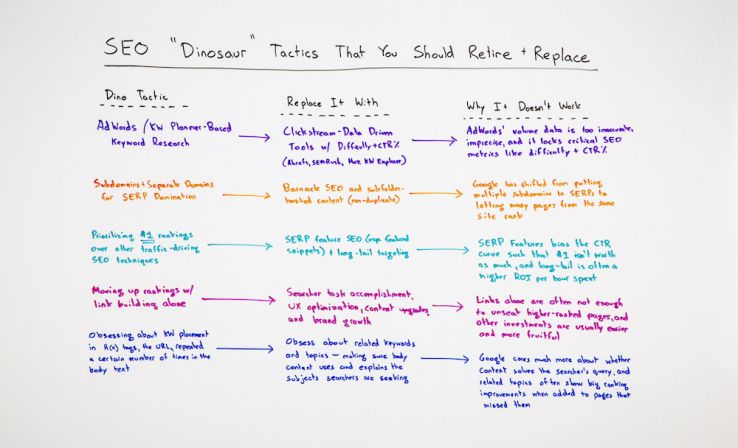News Courtesy of Moz.com:
Dino Tactic #1: AdWords/Keyword Planner-based keyword research
But the first one we'll start with is something we've talked about a few times here — AdWords and Keyword Planner-based keyword research. So you know there's a bunch of problems with the metrics in there, but I still see a lot of folks starting their keyword research there and then expanding into other tools.
Why it doesn't work
I think is just because AdWords hides so many keywords that they don't think are commercially relevant. It's too inaccurate, especially the volume data. If you're actually creating an AdWords campaign, the volume data gets slightly better in terms of its granularity, but we found it is still highly inaccurate as compared as to when you actually run that campaign.
It's too imprecise, and it lacks a bunch of critical metrics, including difficulty and click-through rate percentage, which you've got to know in order to prioritize keywords effectively.
From the 5 Dino Tactics that Moz listed in their article, the first one I feel is the biggest no-no. The statistics given for the results returned in Google’s Keyword Planner don’t necessarily translate over to organic search. You’re also not given important data associated with those results such as difficulty and the number of results listed for any given search term.
The search volume estimate from Keyword Planner typically displays a range. This range can be extremely wide. Take for instance high volume keywords. It’s not uncommon to see an estimate between 10k – 100k. How is anyone supposed to effectively research a keyword based off of that information? There are many premium tools that will provide an exact number rough estimate. SEMRush, Moz Keyword Explorer, and SE Ranking all provide a single number or at worst a limited estimate range for a keyword. The accuracy can be debated, but it is a lot more useful than the wide gulf that Keyword Planner gives you.
Owning page 1 with multiple domains
Also included in Moz’s list is the old “buy separate domains that target the same keywords” tactic. This did work well at one point and it was a method I actually used with great results. In 2018? Not so much. An older client of mine still believes this a good strategy to dominate the first page of Google. I have to remind him that the only constant with Google is change. It’s not easy to tell a client that work you did in the past is no longer effective. However, part of being a good and honest SEO is knowing when to pull the plug on outdated tactics.
Even if you create 100% unique content for a few domains, it’s still better to target separate keywords rather than risk cannibalizing your sites. Branding is everything these days and it makes more sense to create engaging content that you can update periodically in order to have it perform well in the SERPs. Creating supporting posts that link back to a page is a good way to notify search engines that you’re really passionate about that topic. Of course, mega websites like Yelp, Amazon, and Quora have no problem having similar results on page 1. That likely won’t happen for your website. However, by pointing internal and external links to your content-heavy pages you’re telling your audience and the search engines that these pages are important.



